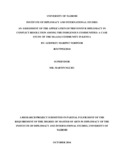| dc.description.abstract | Preventive diplomacy has gained traction in the last few years as a result of its proactive nature of prevention of conflict, conflict management as well as post conflict peacebuilding. This study therefore assessed the application of preventive diplomacy in conflict resolution among the Maasai community in Kenya. The study provided an overview of conflict as well as preventive diplomacy. The theoretical framework used in this study was Johan Galtung’s theory of conflict. The theory helped to understand the key components in a conflict as Galtung identified three factors that is contradiction, attitude and behavior which are the major causes of conflict. In relation to this study understanding the three components will enhance the utilization of preventive diplomacy approached in preventing disputes/conflicts. Mixed method research design was used in the study and primary data was collected using an interview guide a sample size of 10 elders was selected using judgment sampling. The researcher used his own judgment to select the population members who were good prospects for accurate information. The findings of the study include; (a) preventive diplomacy approaches were and continue to be utilized by the Maasai community in conflict resolution, (100% n=10) of the respondents affirmed that preventive diplomacy is being utilized in conflict prevention (b) the respondents were unanimous that preventive diplomacy is beneficial, (100% n=10) indicated mediation as being the most effective approach, (50% n=5) added a combination between good offices, adjudicative dispute resolution and mediation as being effective and (30% n=3 of 10) added negotiation as an effective PD approach while (20% n=2) did not add any other approach (c) in implementing preventive diplomacy; it was evident that there were challenges (80% n=8) indicated conflict of interest and (20% n=2) indicated lack of experience. The study therefore concludes with a world facing challenges of conflicts, preventive diplomacy is an important cost-effective and proactive approach that will save the international community millions of dollars, prevent loss of lives and property and provide sustainable peace. The study finally recommends that indigenous communities be involved in conflict prevention and their knowledge be harnessed to form broader international efforts towards conflict prevention, the United Nations also needs to scale up the application of preventive diplomacy to enhance initiatives for maintenance of international peace and security. | en_US |



